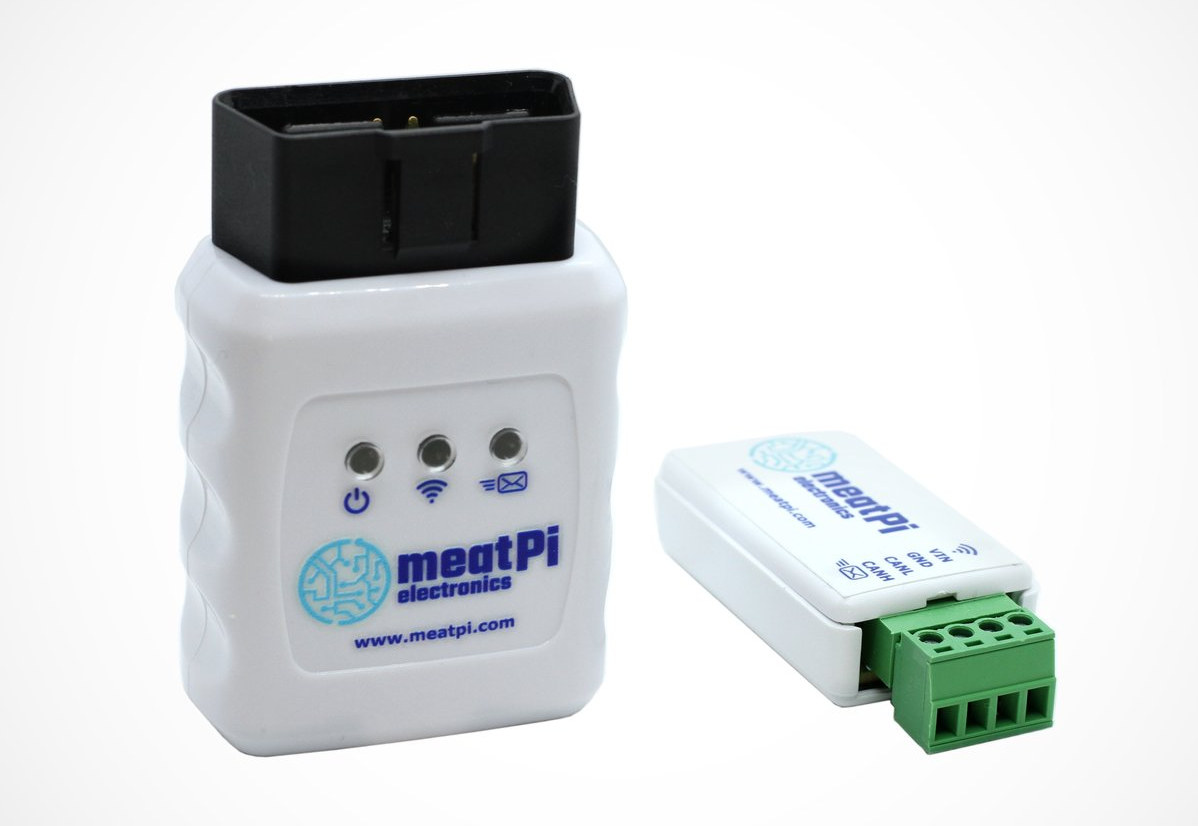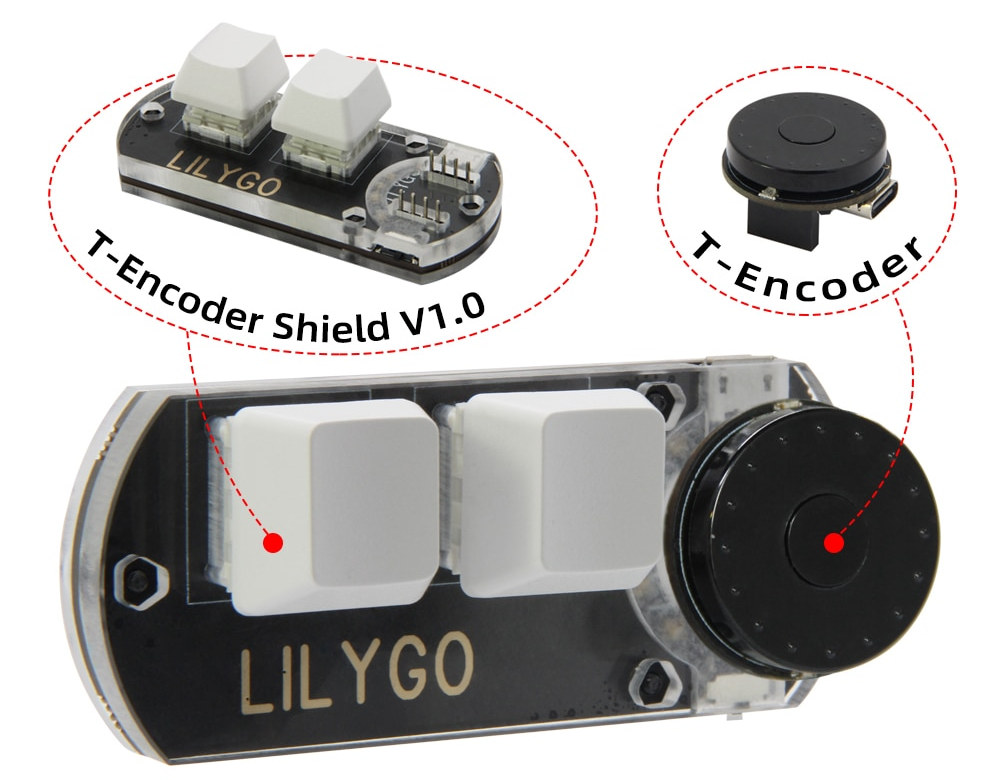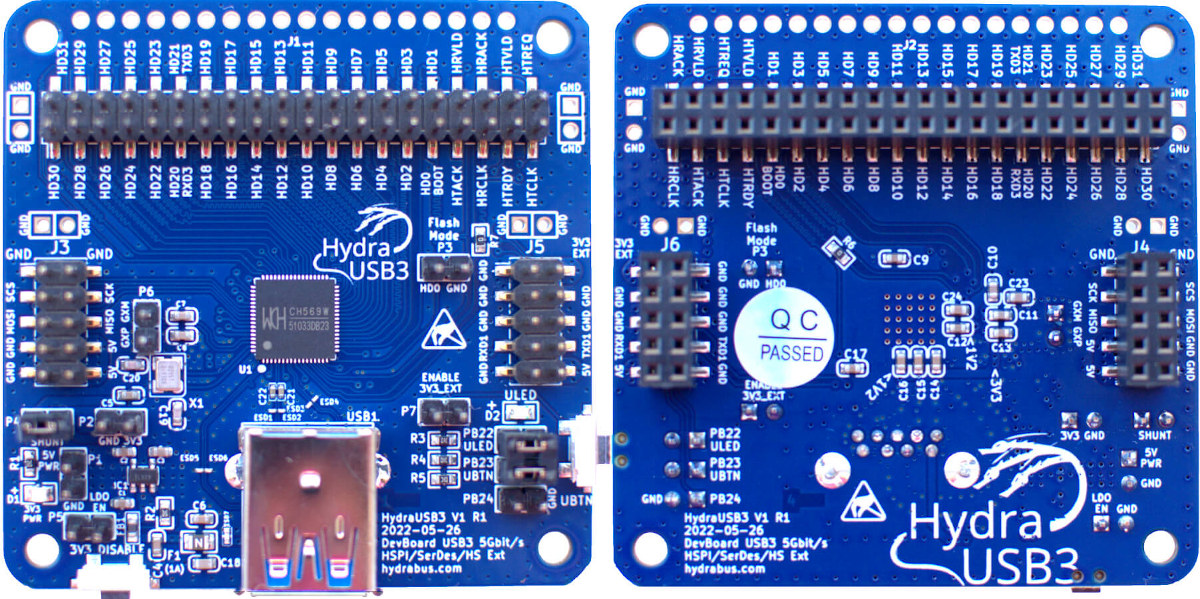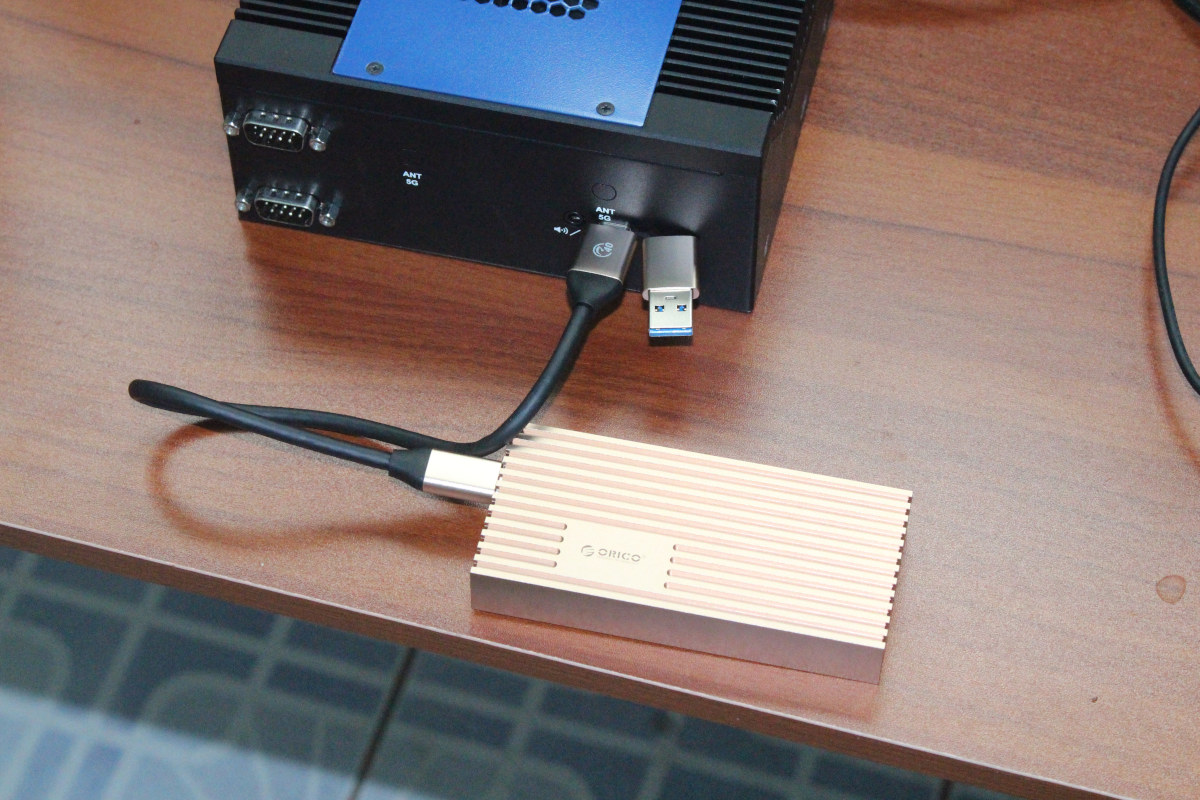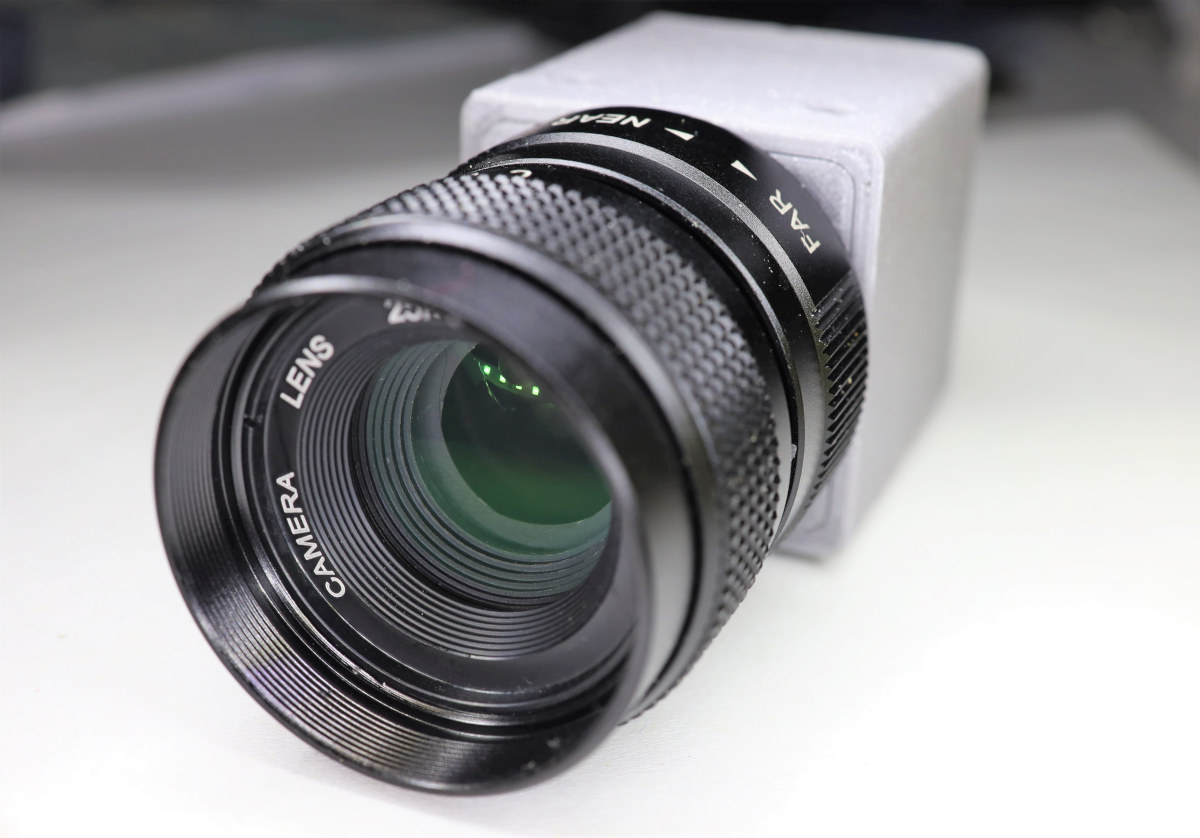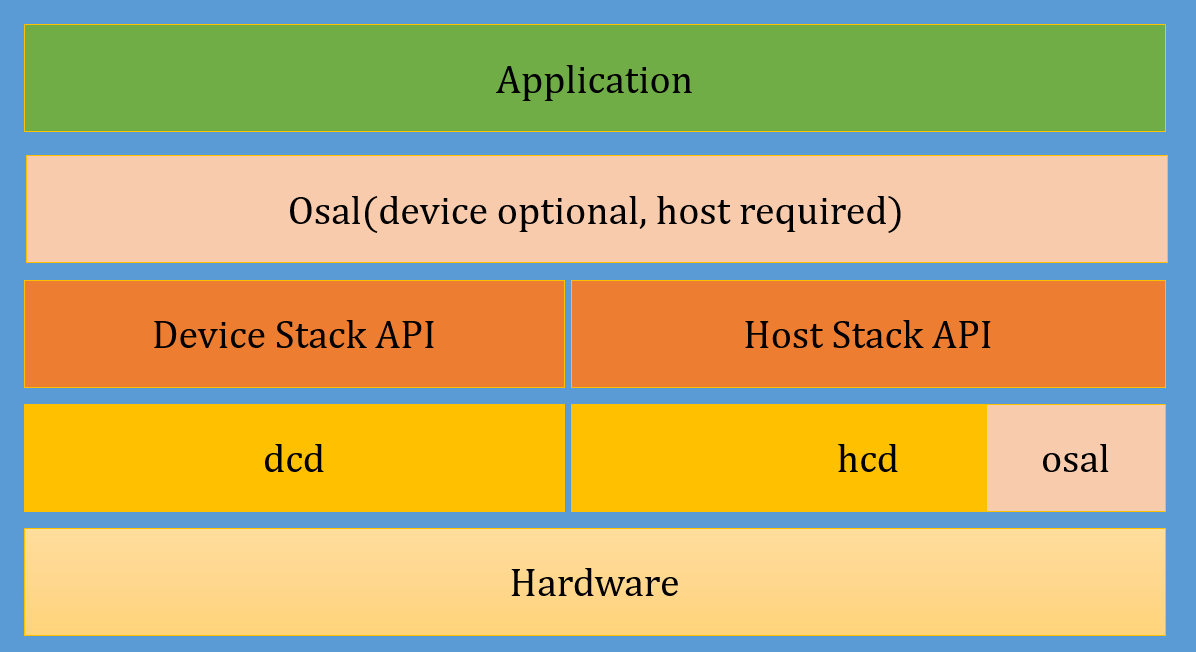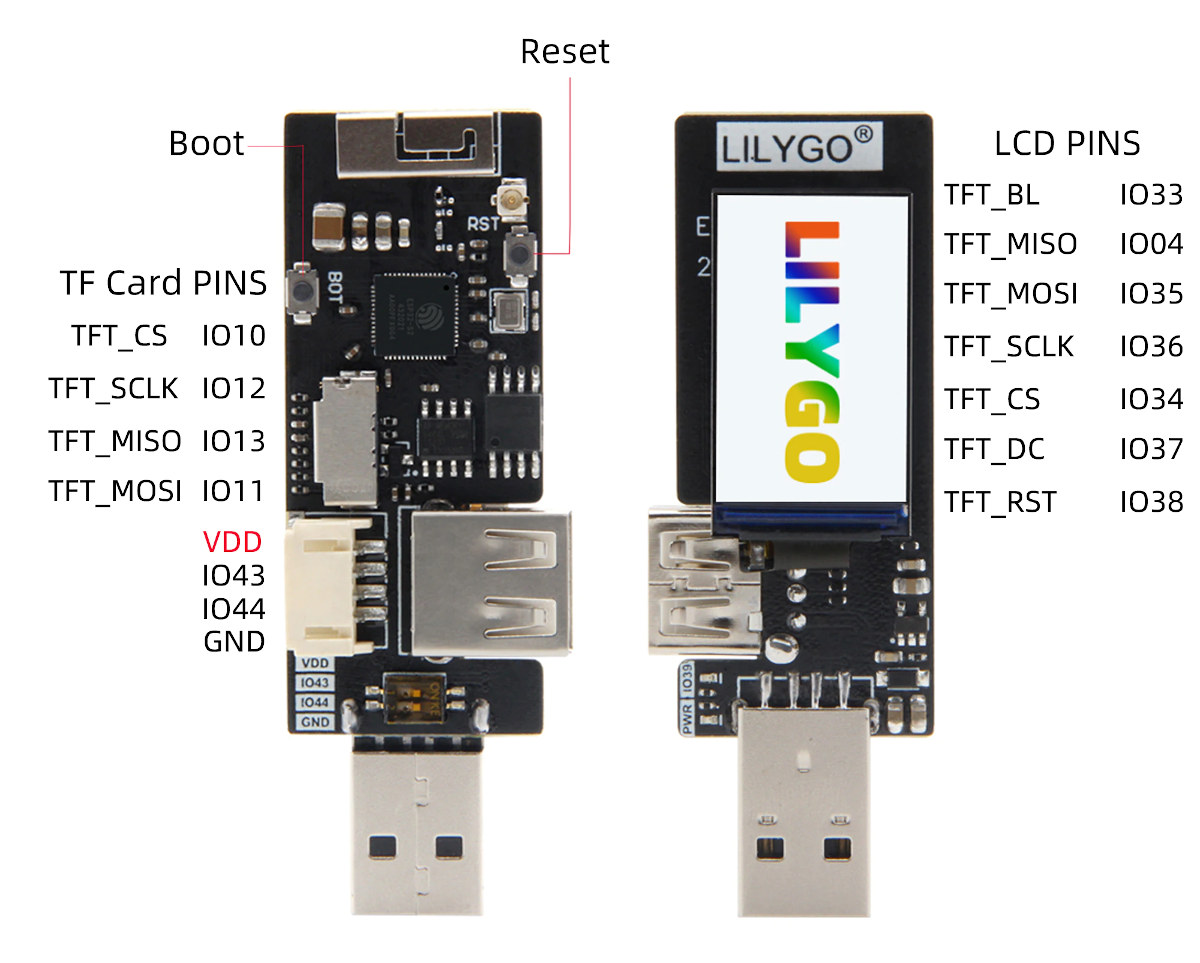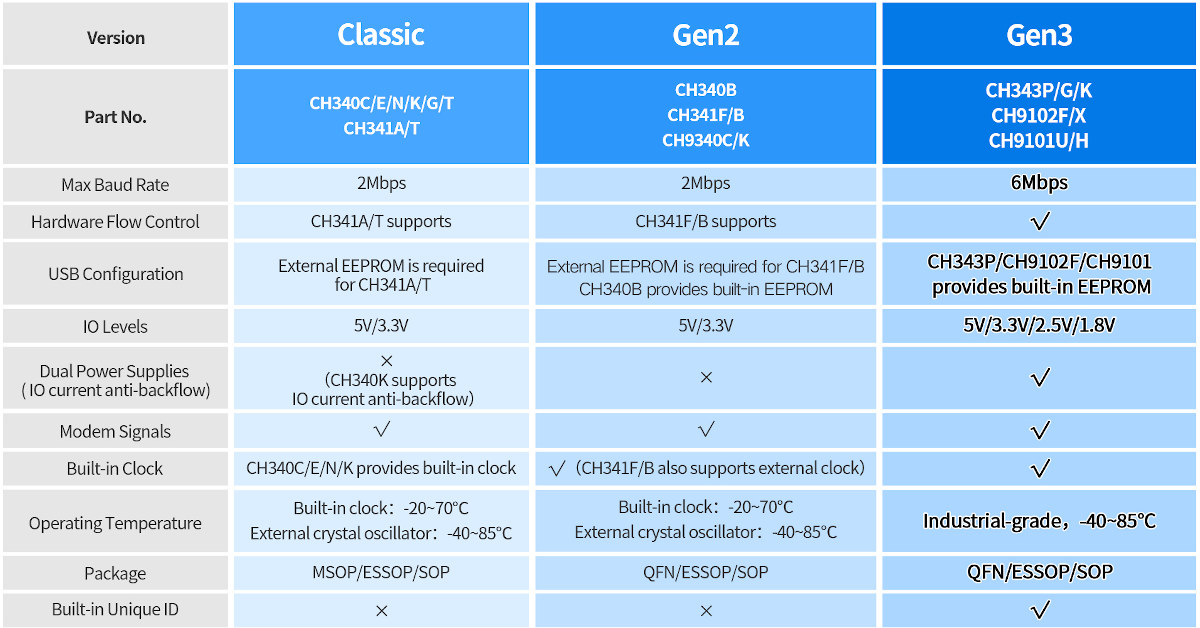WiCAN is an ESP32-C3 CAN bus adapter that works over USB, Wi-Fi, and Bluetooth LE, and designed for car hacking and general CAN bus development. The device is available in USB-CAN and OBD-II form factors and comes with firmware that works with RealDash to create nice-looking dashboards with the data. RealDash can be installed on Android, iOS, and Windows 10 operating systems. WiCAN specifications: Wireless module – ESP32-C3-MINI-1 with ESP32-C3 RISC-V microcontroller with 2.4GHz WiFI 4 and Bluetooth 5.0 connectivity, 4 MB flash, PCB antenna CAN 2.0 A/B interface up to 1 Mbps Host interface WiCAN-OBD – OBD-II connector WiCAN-USB – Mini USB port for USB-to-UART up to 6 Mbps Power Supply WiCAN-ODB – 7.5V to 16V (Vbat) WiCAN-USB – 7.5V to 36V via screw-terminal connector Power Consumption – <= 1 mA in battery-saving mode The CAN Bus adapter also supports firmware updates over WiFi, and can be used either […]
ESP32 board with rotary encoder gets 2-key keypad shield
LILYGO TTGO T-Encoder, a round-shaped ESP32 board with a built-in rotary encoder, has gotten a shield with a 2-key keypad based on WCH CH552 8-bit microcontroller. Launched several months ago, the TTGO T-Encoder is a USB-powered rotary encoder with ESP32 microcontroller offering WiFi and Bluetooth connectivity, and now, you can build a keypad with rotary encoder thanks to T-Encoder shield that features two mechanical switches and keycaps with RGB LED backlight. Since we missed it at launch, let’s check out the tiny TTGO T-Encoder board specifications first: System-in-Package (SiP) – Espressif ESP32-PICO-V3-02 with MCU – ESP32 Xtensa dual-core 32-bit Xtensa LX6 microcontroller up to 240 MHz, 448 KB ROM for booting and core functions, 520 KB SRAM for data and instructions, 2.4 GHz WiFi 4 and Bluetooth 4.2 BR/EDR + LE connectivity Memory – 2MB SPI PSRAM Storage – 8MB SPI flash Dimensions – 7×7 mm Antenna – Ceramic […]
HydraUSB3 RISC-V MCU board combines USB 3.0 with HSPI and SerDes high-speed interfaces
Benjamin VERNOUX has launched the HydraUSB3 V1 board based on WCH CH569 RISC-V MCU as a developer platform to experiment with high-speed protocols like HSPI and SerDes through a USB 3.0 interface. It’s the third board from Benjamin we feature here, after the STM32-based HydraBUS and the HydraNFC v2 shield delivering up to 1600 mW for NFC charging and connectivity. The HydraUSB3 v1 is quite different since it does not involve NFC at all, and instead leverages the CH569’s high-speed interfaces including USB 3.0 (5 Gbps), HSPI (3.8Gbps), and SerDes (>1.2Gbps). HydraUSB3 V1 specifications: MCU – WCH CH569 32-bit RISC-V (RISC-V3A) RV32IMAC MCU @ 120MHz with 16KB 32-bit SRAM, 96KB configurable 128-bit SRAM, 448KB code flash, 32KB data flash USB – 1x USB 3.0 host/device port that supports the USB 3.0 SS built-in PHY (5Gbps) and USB 2.0 built-in PHY FS/LS/HS (480Mbps) High-speed I/Os High-Speed Parallel Interface (HSPI) up to […]
Mini review of ORICO “USB 4.0” M.2 NVMe SSD enclosure
ORICO has sent me a sample of a USB 4.0 M.2 NVMe SSD enclosure for review, which was timely as I did not have a fast USB storage option for testing. In this post, I’ll check out the hardware, show how to install an NVMe SSD, and test performance in UP Xtreme i11 mini PC since it happens to come with a USB4 port. ORICO USB 4.0 M.2 SSD enclosure specs and unboxing The exact model I received is the ORICO M234C3-U4 with a Rose Gold aluminum enclosure (107x50x17mm), supporting M.2 M-Key and B+M Key 2230, 2242, 2260, 2280 SSDs (more on that later), and offering up to 40 Gbps through its USB 4.0 port. The device ships with a USB Type-C to USB Type-C/Type-A cable, a thermal pad, a heatsink, two screws, and a multilingual user manual. There’s only one USB Type-C port one the device. M.2 NVMe SSD […]
Open-source hardware USB Type-C industrial camera features Lattice Crosslink NX FPGA
Gaurav Singh, acting as Circuit Valley, has designed an open-source hardware USB 3.0 Type-C industrial camera with three boards: one to capture data through a CMOS sensor, another based on a Lattice Crosslink NX FPGA to handle image processing, and finally, a board equipped with an Infineon FX3 USB 3.0 controller for sending the video data to the host. This design allows the DIY camera to be extremely flexible, as for instance, you could keep the FPGA and USB board, and simply change the sensor board for a better/different camera. A 3D printable enclosure is also provided, and the camera supports C-mount lenses, so the lens can also be easily changed as required. Here’s what the final result looks like. Camera specifications: Sensor board Sensor for example Sony IMX290, IMX327, or IMX462 Oscillator FPGA/Host board interface – High-density connector with I2C, 4-lane MIPI with clock, I2C, a few other control […]
CherryUSB – A lightweight USB device/host stack for embedded systems
CherryUSB is a lightweight open-source USB device/host stack for embedded systems with one or more USB interfaces. The stack implements various class drivers such as CDC, HID, MSC, audio, video, and so on. It’s apparently part of Boufallo Lab SDK (e.g. for BL702 MCU), and has been ported and tested with WCH CH32V307 RISC-V MCU, STMicro STM32F4, and Nuvoton NUC442 Cortex-M4 microcontroller, as well as a two Arm Cortex-M3 microcontrollers I’ve never heard of: EastSoft ES32F3 and MindMotion MM32L3xx. CherryUSB device stack highlights: Support for USB2.0 full and high speed Endpoint irq callback USB classes support Composite Device Communication Device Class (CDC) Human Interface Device (HID) including “Custom HID” Mass Storage Class (MSC) USB VIDEO Class (UVC1.0,UVC1.5) USB AUDIO Class (UAC1.0, UAC2.0) Device Firmware Upgrade CLASS (DFU) MIDI CLASS (MIDI) Test and Measurement CLASS (TMC) Vendor class Remote NDIS (RNDIS) support Support WINUSB 1.0,WINUSB 2.0 with BOS (Binary Device Object […]
T-Dongle ESP32-S2 WiFi development board comes with two USB OTG ports
LilyGO has been very busy in recent weeks, and their latest product is the “T-Dongle ESP32-S2” development board that looks very much like Espressif ESP32-S3-USB-OTG board development board but is equipped with the single-core WiFi-only ESP32-S2 processor instead of the dual-core ESP32-S3 SoC with WiFi 4 and Bluetooth 5.0. The T-Dongle ESP32-S2 board is designed for the development of USB applications and comes with USB OTG female and male ports, as well as the same 1.14-inch color display found on T-Display RP2040/ESP32 and T-PicoC3 boards. T-Dongle ESP32-S2 development board specifications: Wireless SoC – Espressif Systems ESP32-S2 single-core Xtensa LX7 processor @ up to 240 MHz with 320 kB SRAM, 128 kB ROM, WiFi 4 connectivity Antennas – 3D antenna, IPEX antenna connector Storage – MicroSD card socket Display – 1.14-inch full-color IPS LCD Display (ST7789V SPI controller) with 240 x 135 resolution USB 1x USB OTG female port to connect […]
WCH CH343 USB to serial chips support 1.8V to 5V IO voltage, 6 Mbps baud rate, custom VID/PID
WCH CH340 family of USB to serial chip is very popular, and often found on development boards for debugging/access to the serial console, but the company has now introduced the CH343 “Gen3” chip – just like CH9102F apparently – with a higher 6 Mbps baud rate, support for 1.8V, 2.5V, 3.3V, and 5V IO voltage, and the ability to request custom USB VID/PID numbers. Three variants exist with CH343P, CH343G, and CH343K with different packages: QFN16, SOP16, and ESSOP10 respectively. CH343P contains an EEPROM for easy customization, while CH343G and CH343K PID/VID can still be customized for larger orders. CH343 key features and specifications: Full-speed USB 2.0 device interface Hardware full-duplex serial UART interface with baud rate varies from 50bps to 6Mbps. Automatic identification and dynamic adaptation of common communication baud rate of 115200bps and below. Supports 5, 6, 7, or 8 data bits, as well as odd, even, space, […]


